Module 11 Body language模块导学课件
文档属性
| 名称 | Module 11 Body language模块导学课件 | 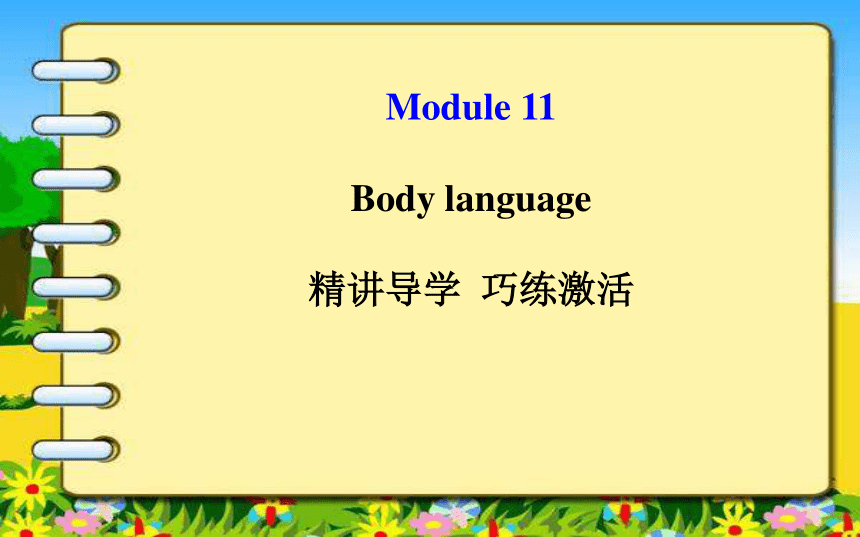 | |
| 格式 | zip | ||
| 文件大小 | 4.5MB | ||
| 资源类型 | 教案 | ||
| 版本资源 | 外研版 | ||
| 科目 | 英语 | ||
| 更新时间 | 2015-03-21 14:44:04 | ||
图片预览


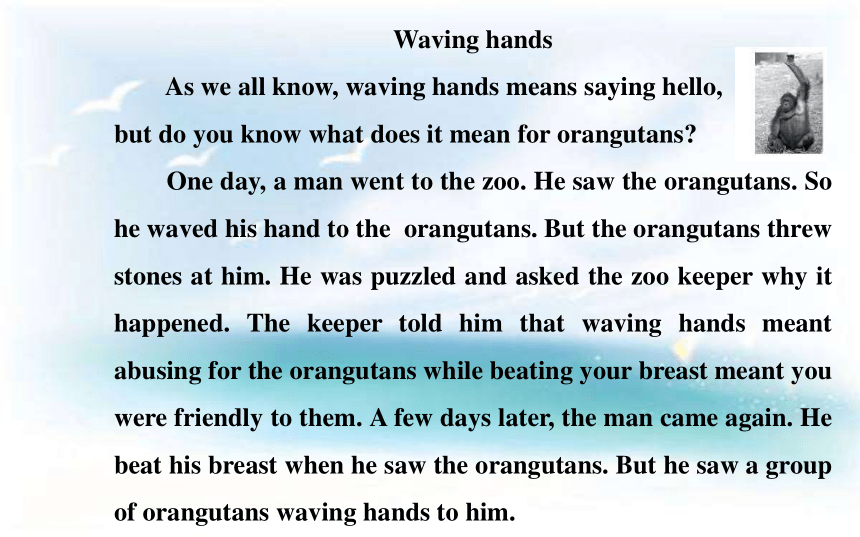
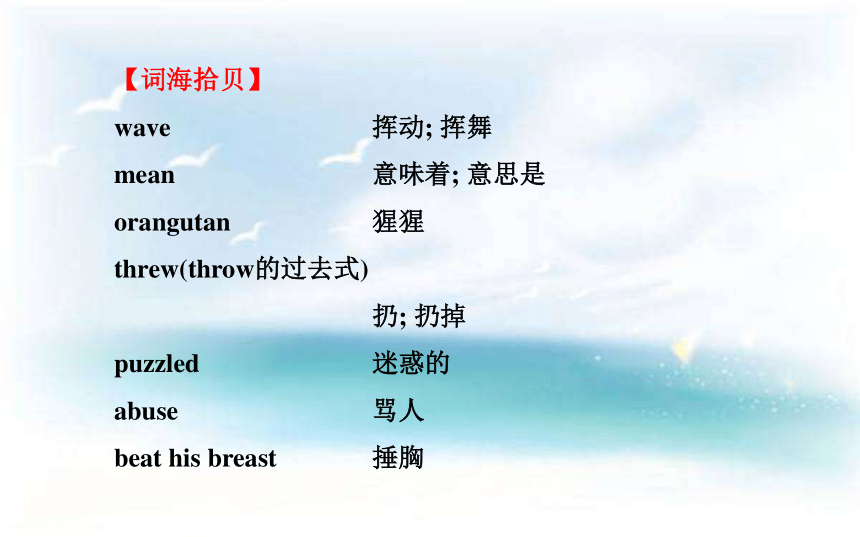

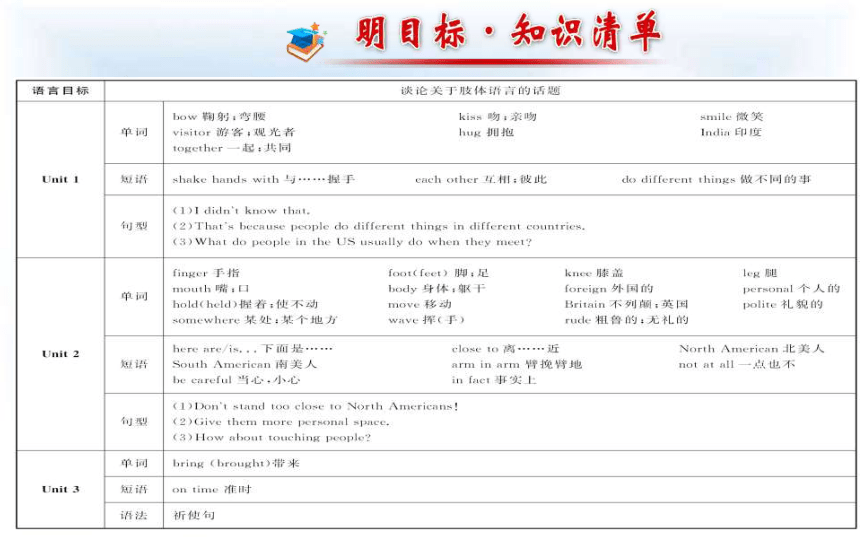
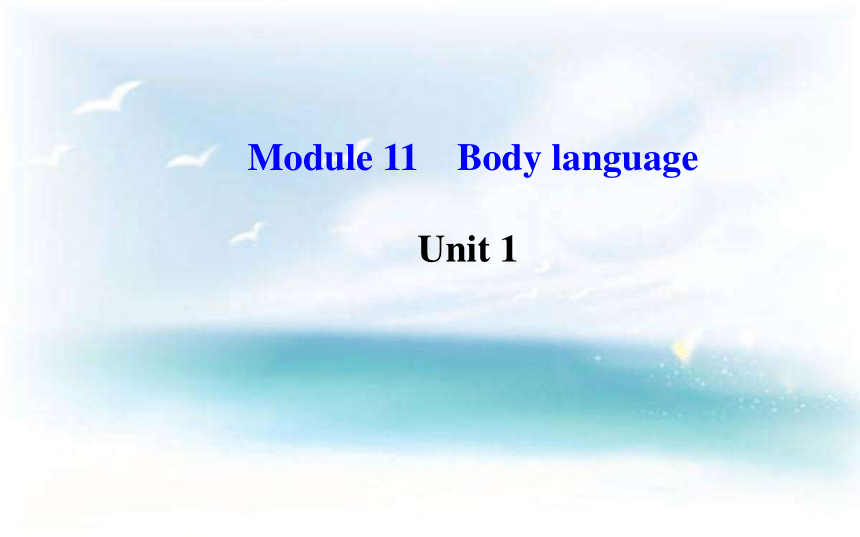
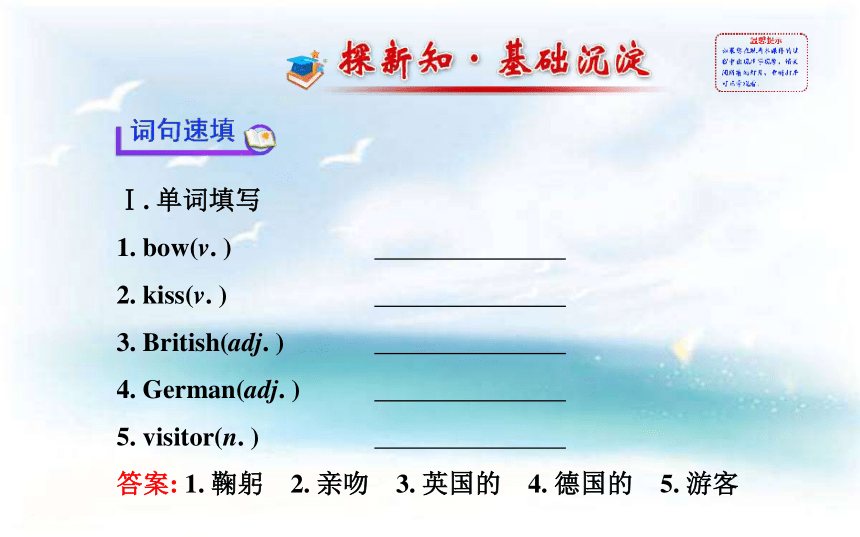
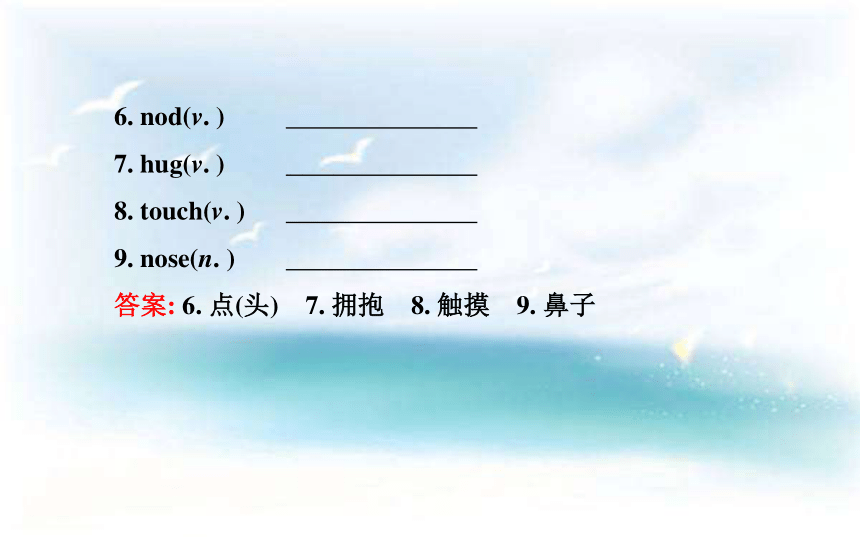
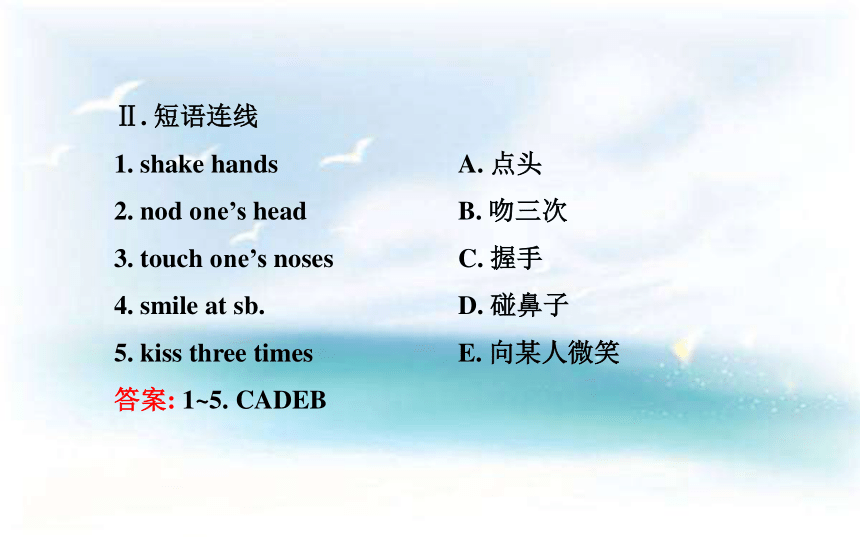
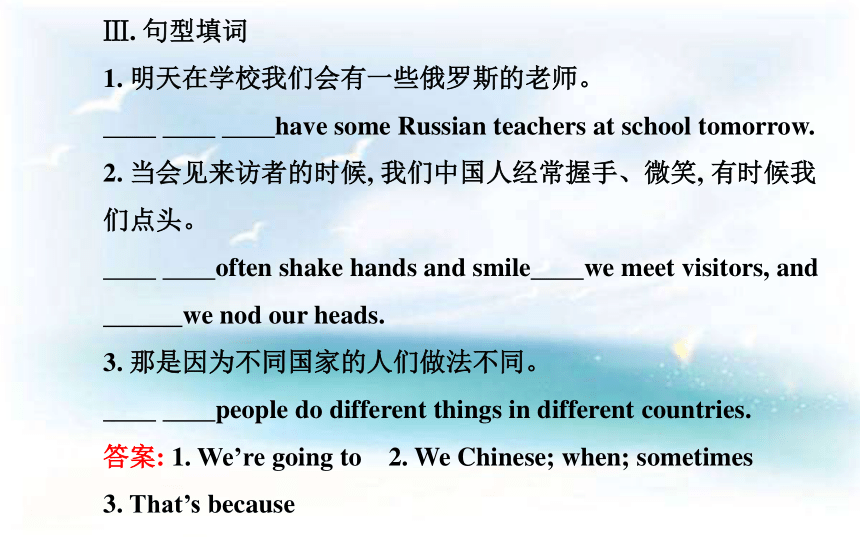
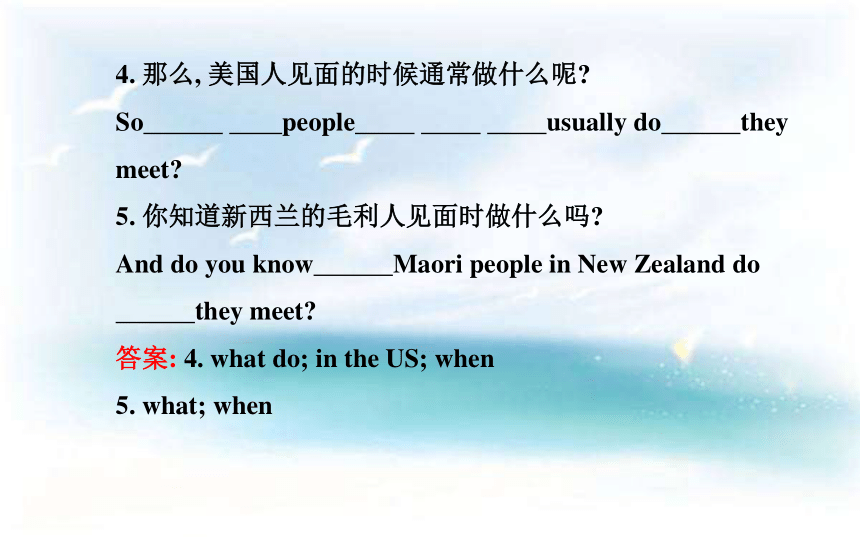
文档简介
课件92张PPT。Module 11
Body language
精讲导学 巧练激活【导语】肢体语言也是文化的一部分。除世界公认的肢体语言外, 不同的文化有各自的肢体语言。跨文化交际时, 相同的肢体语言形式可能具有完全不同的意义。Waving hands
As we all know, waving hands means saying hello,
but do you know what does it mean for orangutans?
One day, a man went to the zoo. He saw the orangutans. So he waved his hand to the orangutans. But the orangutans threw stones at him. He was puzzled and asked the zoo keeper why it happened. The keeper told him that waving hands meant abusing for the orangutans while beating your breast meant you were friendly to them. A few days later, the man came again. He beat his breast when he saw the orangutans. But he saw a group of orangutans waving hands to him. 【词海拾贝】
wave 挥动; 挥舞
mean 意味着; 意思是
orangutan 猩猩
threw(throw的过去式)
扔; 扔掉
puzzled 迷惑的
abuse 骂人
beat his breast 捶胸【我的感悟】
When in Rome, do as the Romans do. (入乡随俗。)Module 11 Body language
Unit 1?Ⅰ. 单词填写
1. bow(v. ) ?
2. kiss(v. ) ?
3. British(adj. ) ?
4. German(adj. ) ?
5. visitor(n. ) ?
答案: 1. 鞠躬 2. 亲吻 3. 英国的 4. 德国的 5. 游客6. nod(v. ) ?
7. hug(v. ) ?
8. touch(v. ) ?
9. nose(n. ) ?
答案: 6. 点(头) 7. 拥抱 8. 触摸 9. 鼻子Ⅱ. 短语连线
1. shake hands A. 点头
2. nod one’s head B. 吻三次
3. touch one’s noses C. 握手
4. smile at sb. D. 碰鼻子
5. kiss three times E. 向某人微笑
答案: 1~5. CADEBⅢ. 句型填词
1. 明天在学校我们会有一些俄罗斯的老师。
have some Russian teachers at school tomorrow.
2. 当会见来访者的时候, 我们中国人经常握手、微笑, 有时候我
们点头。
often shake hands and smile we meet visitors, and
we nod our heads.
3. 那是因为不同国家的人们做法不同。
people do different things in different countries.
答案: 1. We’re going to 2. We Chinese; when; sometimes
3. That’s because4. 那么, 美国人见面的时候通常做什么呢?
So people usually do they
meet?
5. 你知道新西兰的毛利人见面时做什么吗?
And do you know Maori people in New Zealand do
they meet?
答案: 4. what do; in the US; when
5. what; when①In which country do people touch
noses when they meet?
?
答案: In New Zealand.
②Generally, kiss in China.
A. girls B. the old
C. only parents and sons D. only parents and children1. each pron. 各个; 每个
【语境领悟】
*In the US some people shake hands, and some kiss or hug each other. 在美国, 有些人握手, 有些人亲吻或者彼此拥抱。
*She knows each student of the class.
她认识班级中的每个学生。
*She knows every student of the class.
她认识班级中的所有学生。【自主归纳】
each意为“各个; 每个”, 常与other构成固定短语each other“互相”。【归纳拓展】 each与every的不同【学以致用】
①每个学生都在教室里, 各人做各人的作业。
student is in the classroom, and does his homework.
②他给父母各送了一本书。
He gave a book to of his parents.
答案: ①Every; each ②each2. That’s because people do different things in different countries.
那是因为不同国家的人们做法不同。
【句型剖析】
That’s because. . . 意为“那是因为……”, 后接表示原因的句子。
That’s because you were not careful enough.
那是因为你不够仔细。【归纳拓展】that’s because与that’s why的区别【温馨提示】
that’s because/why是个常用句式, 其中, that表示刚刚谈到的内容。注意在这个句式中, 只能用that, 不能用this, 因为this表示将要谈到的内容。【学以致用】
①吉米今天早晨睡过头了。那就是他上学迟到的原因。
Jimmy overslept this morning. he was late for school.
②托尼今天早晨上学迟到了。那是因为他睡过头了。
Tony was late for school this morning. he overslept.
答案: ①That’s why ②That’s because【备选要点】
smile n. & v. 微笑
【语境领悟】
*She welcomed us with a smile. 她微笑着欢迎我们。
*Why are you smiling? 你为什么笑?
*What are you smiling at? 你在笑什么? 【自主归纳】
(1)smile作名词, 意为“微笑”, 常指无声的笑。with a smile意为“带着微笑”。若表示“一个……微笑”时, 中间可加入其他修饰语。
一个甜甜的微笑 a sweet smile
一个灿烂的微笑 a big smile
(2)smile作动词, 意为“微笑”。作不及物动词, 若表示“向……微笑”时, 要接at。【学以致用】
①我们见面时应该微笑。
We should when we meet.
②他微笑着向学生们问候。
He said hello to the students with .
答案: ①smile ②a smileⅠ. 从方框中选择恰当的单词完成下列句子
what British bow welcome different
1. —Have you got a passport(护照)?
—No, I haven’t.
2. to our new hotel. This way, please.
3. When we meet old people, we should(应该) to them.
4. —My dog died yesterday.
— ! I’m sorry to hear that.
5. Tom went to cities in China and he loves China now.
答案: 1. British 2. Welcome 3. bow 4. What 5. differentⅡ. 单项选择
1. Some visit the Great Wall every year.
A. visiter B. visitor C. visitors D. visiters
2. Chinese often when they meet.
A. shake hands B. shakes hands
C. touch noses D. touch heads3. They help when they are in need.
A. each B. each other
C. the other D. every other
4. They all live in a three-bedroom house.
A. together B. with C. each D. and
5. He got up late. he came late.
A. That’s why B. That’s because
C. This is why D. This is becauseModule 11 Body language
Unit 2?Ⅰ. 单词填写
1. finger(n. ) ?
2. rude(adj. ) ?
3. knee(n. ) ?
4. body(n. ) ?
5. foreign(adj. ) ?
答案: 1. 手指 2. 粗鲁的 3. 膝盖 4. 身体 5. 外国的6. personal(adj. ) ?
7. move(v. ) ?
8. polite(adj. ) ?
9. somewhere(adv. ) ?
10. wave(v. ) ?
11. foot(n. )脚→(复数形式) ?
答案: 6. 个人的 7. 移动 8. 礼貌的 9. 某处 10. 挥(手)
11. feetⅡ. 短语互译
1. 站得太近 ?
2. 臂挽臂 ?
3. 一点也不 ?
4. 事实上 ?
5. personal space ?
6. move away ?
7. say goodbye to sb. ?
8. be careful ?
答案: 1. stand too close 2. arm in arm 3. not at all 4. in fact 5. 个人空间 6. 走开, 搬走 7. 向某人告别 8. 小心, 认真Ⅲ. 句型填词
1. 这里是一些欢迎他们的方法。
some ways to welcome them.
2. 当你和一个朋友聊天的时候, 你站得离他有多近?
do you stand you talk to a friend?
3. 给他们更多个人空间。
personal space.
答案: 1. Here are 2. How close; when
3. Give them more 4. 触摸人怎么样?
touching people?
5. 在一些地方, 当你说话的时候看着人是不礼貌的。
In some places, polite at people when you talk.
答案: 4. How about 5. it isn’t; to lookCan we stand close to people in the
Middle East?
?
2. Is it polite to wave to say goodbye in Greece?
?
答案: 1. Yes, we can. 2. No, it isn’t. 1. move v. 移动
【语境领悟】
*. . . so you can’t move away!
……因此你不能走开!
*We’re moving to our new house.
我们要搬到我们的新家里去。
*It was raining, but the army moved on.
天下着雨, 但部队继续前进。【自主归纳】
move意为“移动”, 在本句中与away一起构成短语move away“走开”。
He moved away without saying a word.
他没说一句话就走开了。【归纳拓展】 move的不同搭配
(1)move away搬开, 搬走。
Please move the big box away.
请把这个大箱子搬走。
(2)move to后加地点名词, 表示“搬到某个地方”。
(3)move on继续前进。【图解助记】【学以致用】
①请把它搬走!
it , please!
②在1592年, 莎士比亚搬到了伦敦。
In 1592, Shakespeare London.
③天气不好, 我们还要继续前行吗?
The weather is bad. Will we ?
答案: ①Move; away ②moved to ③move on2. arm in arm臂挽臂
【语境领悟】
*Chinese girls often walk arm in arm with their friends.
中国女孩经常和朋友一起臂挽臂行走。
【自主归纳】
arm in arm意为“臂挽臂”, 表示走路的方式。
The girl is walking arm in arm with her mother.
那个女孩正和妈妈臂挽臂地走。【归纳拓展】 英语中一些类似的表达【温馨提示】注意这些短语中的介词不同。【学以致用】
①女孩子们喜欢手拉着手散步。
Girls like walking .
②他和弟弟正背靠背坐着。
He and his brother are sitting .
③这两个男孩经常并排骑车。
The two boys often ride .
答案: ①hand in hand ②back to back ③side by side【备选要点】
1. not at all一点儿也不
【语境领悟】
*But in Britain many people don’t like other people to touch them at all.
但是在英国, 许多人一点儿也不喜欢别人触摸他们。
*—Thank you for your help. ——感谢您的帮助。
—Not at all. ——别客气。
*—Are you busy? ——你忙吗?
—Not at all. ——一点不忙。【归纳拓展】not at all的三种含义【学以致用】
①—I’m sorry I’m late.
—Oh, , do come in.
A. all right B. OK C. good D. not at all
②学英语一点儿也不难。
It difficult to study English.
答案: isn’t; at all2. In some places, it isn’t polite to look at people when you talk. . .
在一些地方, 你说话的时候看着别人是不礼貌的……【句型剖析】
本句是含有时间状语从句的复合句。其中主句中的主语是to look at people, it是形式主语。
形式主语
↑
(In some places), it isn’t polite【to look at people】
↓ ↓ ↓
地点状语 主句 (真正主语)
when you talk.
↓
时间状语从句【归纳拓展】
be polite to sb. 对某人有礼貌
He is always polite to his parents. 他总是对父母很有礼貌。【学以致用】
①你太客气了。
You’re too .
②见到老师问好是很有礼貌的。
say hello when you meet the teachers.
③不要对你的爸爸如此无礼。
Don’t be so your father.
答案: ①polite ②It’s polite to ③rude/impolite toⅠ. 选词填空
close to; late for; arm in arm;
different from; held his arm
1. I don’t like to be school.
2. The policeman caught up with(追上)the thief and .
3. His home is very our school.
4. Can you do something what you did just now?
5. The two children are walking .
答案: 1. late for 2. held his arm 3. close to
4. different from 5. arm in armⅡ. 单项选择
1. I don’t like green apples .
A. very B. quite C. very much D. at all
2. talk in class.
A. Please not B. Doesn’t C. Don’t D. Didn’t
3. Class, I’ll tell you some ways English well.
A. learns B. learning C. to learn D. learned4. My pen friend is from a country.
A. foreigner B. foreigners C. foreign D. west
5. It’s important the teacher.
A. to listen to B. to listen
C. listened D. listened toModule 11 Body language
Unit 3?bring v. 带来
【语境领悟】
*You cannot bring food or drink into the lab.
你不能把食品或饮料带入实验室。
*I brought a basket of flowers to my mother.
我给妈妈带来一篮鲜花。【自主归纳】
(1)bring意为“带来”, 其过去式为brought。
Bring your homework here tomorrow.
明天把你的作业带到这里来。
(2)bring/take/carry/get的辨析【图解助记】【学以致用】
①What did he here?
A. take B. carry C. get D. bring
②He brought us some fruit. (改为同义句)
He some fruit us.
答案: brought; to【备选要点】
all right好; 行; 可以
【观察理解】
*Is it all right to wave goodbye in Greece?
在希腊挥手再见可以吗?
*—Thank you very much.
——非常感谢。
—That’s all right.
——不用谢。
*Is her answer right? 她的答案正确吗? 【自主归纳】right/all right/That’s all right. 的区别【学以致用】
①—Let’s go and ask him.
— .
A. All right B. Right
C. That’s right D. That’s all right
②—I’m sorry. I broke a cup.
— .
A. It’s all right B. That’s all right
C. That’s right D. All right祈使句
【观察领悟】
仔细观察下列每组例句, 画出每组句子的第一个单词并说出其结构(肯定/否定)。【知识构建】
1. 定义: 用于表达命令、请求、劝告、警告、禁止等的句子叫作祈使句。
2. 结构。
①肯定句:
以动词原形开头。(祈使句因主语是第二人称, 所以通常都省略。)有时为了表示请求或客气, 可在句首或句尾加上please。
Go and bring your biscuits. 去把你的饼干拿来。
Look at the blackboard, please. 请看黑板。②否定句:
在句首加Don’t。
Don’t take photos here. 不要在这儿拍照。
Don’t let him go. 别让他走。
③Be开头:
Be+名词/形容词+其他
Be a good boy! 要做一个好孩子!
Be quick. 快点。【巧学助记】
祈使句无主语, 因为主语常省去;
如果变成否定句, Don’t开头是规律。
表示请求或客气, 加上please就可以。
句子动词无实义, 开头则要用上be。【学以致用】
Ⅰ. 完成句子
1. 请保持安静。
Please .
2. 屋里太热了。请打开窗户。
It’s too hot in the house. Please .
3. 不要独自在河里游泳。
alone in the river.
答案: 1. be/keep quiet 2. open the window 3. Don’t swim4. 请不要大声说话。
Please loudly.
5. 不要把食物和饮料带入图书馆。
food or drink into the library.
答案: 4. don’t talk 5. Don’t bringⅡ. 单项选择
1. If you are tired, a rest.
A. have B. having C. to have D. will have
2. The TV is too loud. Please .
A. turning it down B. to turn it down
C. turn it down D. will turn it down3. late again, Bill!
A. Don’t to be B. Don’t be
C. Not be D. Be not
4. cross the road until the traffic lights turn green.
A. Not B. Won’t C. Didn’t D. Don’t
5. Boys and girls, here early tomorrow please. We’ll have something important to do.
A. comes B. come C. to come D. coming 假设你们学校将会有一些来自不同国家的学生, 请根据下列表格内容, 介绍应该如何礼貌地与他们相处, 包括站的距离远近, 以及是否可以去接触他们等。 要求: 1. 词数80个左右(开头已给出, 不计入总词数);
2. 字迹工整, 语言流畅, 表达正确, 逻辑清晰。 【思路点拨】
(1)体裁: 说明文。
(2)人称: 第二人称或第三人称。
(3)时态: 一般现在时。【写作模板】【妙笔成篇】
Our new foreign students are going to arrive very soon, and here are some ways to welcome and get along with them.
_________________________________________________________________________________________________________________________________________________________________【参考范文】
Our new foreign students are going to arrive very soon, and here are some ways to welcome and get along with them.
How close do you stand when you talk to them? You can stand close to people from the Middle East but don’t stand too close to Americans. Give them more personal space. How about touching them? Please be careful! It’s polite to bow to students from Japan. And for students from Maori, New Zealand, you should touch their noses. When you meet Americans, it’s polite to shake hands or hug them, but don’t kiss them. Remember: Smile is the best way to welcome them. Ⅰ. 用所给词的适当形式填空
1. It isn’t polite (laugh)at others.
2. A (woman)age is secret in the western countries.
3. (not talk)in class.
4. They waved (say)goodbye to us.
5. They come from different (country).
答案: 1. to laugh 2. woman’s 3. Don’t talk 4. to say
5. countriesⅡ. 用适当的介词填空
1. In school, you should listen your teacher.
2. Don’t touch people when you talk them.
3. When a girl walks in front of you, please open the door
her.
4. fact, it’s very rude.
5. Don’t be late next time. Please be time.
答案: 1. to 2. to/with 3. for 4. In 5. onⅢ. 句型转换
1. They can play the piano and sing songs. (改为否定句)
They play the piano sing songs.
2. You can’t go to bed too late. (改为祈使句)
to bed too late.
3. We aren’t late for school every day. (改为同义句)
We go to school every day.
答案: 1. can’t; or 2. Don’t go 3. on time4. the; we; line; when; wait; stand; for; we; in; bus; should; (连词成句)
?
5. People bow to say “I’m sorry” in this country. (对画线部分提问)
people bow to say in this country?
答案: 4. We should stand in line when we wait for the bus.
5. What do模块复习课
Module 11 Body languageⅠ. 词汇速记
1. 鞠躬(v. ) ?
2. 亲吻(v. ) ?
3. 微笑(v. &n. ) ?
4. 一起; 共同(adv. ) ?
5. 触摸(v. ) ?
答案: 1. bow 2. kiss 3. smile 4. together 5. touch6. 握着; 使不动(v. ) ?
7. 某处(adv. ) ?
8. 挥手(v. ) ?
9. 粗鲁的; 无礼的(adj. ) ?
10. 带来(v. ) ?
答案: 6. hold 7. somewhere 8. wave 9. rude 10. bring11. person(n. ) → (adj. )个人的
12. Russia(n. ) → (n. )俄罗斯人
13. Britain(n. ) → (n. )英国人
14. visit(v. ) → (n. )游客; 观光者
15. foreign(adj. ) → (n. )外国人
16. polite(adj. ) → (adj. )不礼貌的
答案: 11. personal 12. Russian 13. British 14. visitor
15. foreigner 16. impoliteⅡ. 短语互译
1. 握手 hands
2. 离……近 (be)close ?
3. 臂挽臂 arm arm
4. 搬走 move ?
5. 事实上 fact
6. 站成一排 stand ?
7. 指着 point ?
8. on time ?
9. hold on to ?
答案: 1. shake 2. to 3. in 4. away 5. in 6. in line
7. at 8. 按时 9. 抓住不放; 紧紧抓住Ⅲ. 句型攻关
1. ——当你见到俄罗斯人时, 你要吻他们三次。
—When you meet Russians, you kiss them three times.
——我以前不知道。
—I that.
2. ——他为什么匆忙离开?
—Why does he leave in a hurry?
——因为他妈妈住院了。
— his mother is in hospital.
答案: 1. didn’t know 2. That’s because 3. 不要站得离那条狗太近!
too close to the dog!
4. 唱首歌怎么样?
singing a song?
5. 课堂上认真听老师讲课是很重要的。
It’s important the teacher in class.
答案: 3. Don’t stand 4. How/What about 5. to listen toⅣ. 语法专练
1. Will you please read it again more slowly? (改为祈使句)
again more slowly, please.
2. If you don’t listen to me, I’ll go. (改为同义句)
me, or I’ll go.
3. Let’s watch the sports games. (改为反意疑问句)
Let’s watch the sports games, ?
答案: 1. Read it 2. Listen to 3. shall we 4. The teachers often tell the students not to be careless. (改为祈使句)
careless, please.
5. Please sit next to Nancy. (改为否定句)
next to Nancy.
答案: 4. Don’t be 5. Don’t sitⅤ. 真题体验
1. (2014·广州中考)—Sorry I’m late.
— tell me the bus broke down again!
A. Never to B. Not C. Don’t D. No
【解析】选C。考查祈使句。句意: ——很抱歉, 我迟到了。
—— 告诉我公共汽车又坏了! 由句意知, 句子为否定意义, 故选C。2. (2014·安徽中考)—Can I bring a friend to your birthday party?
—Sure, .
A. no problem B. not at all
C. my pleasure D. well done
【解析】选A。考查交际用语。句意: ——我可以带一个朋友到你的生日聚会吗? ——当然可以, 。no problem“没问题”, not at all“一点也不”, my pleasure“很荣幸”, well done“干得好”。结合句意选A。3. (2014·达州中考)—I’m sorry I my exercise book at home this morning.
—It doesn’t matter. Don’t forget it here this afternoon.
A. left; to take B. forgot; bringing
C. left; to bring D. forgot; to bring
【解析】选C。考查动词的用法。句意: ——很抱歉, 今天早上我把练习本忘在家里了。——没关系。今天下午不要忘了把它带来。leave sth. at home“把……忘在家里”, bring“带来”, take“带走”。故选C。4. (2014·昆明中考)—Where would you like to go this Mid-Autumn Festival?
—I’d like to go .
A. everywhere relaxing B. somewhere relaxing
C. peaceful anywhere D. peaceful somewhere
【解析】选B。考查不定代词的用法。句意: ——今年中秋节你想去哪儿? ——我想去某个放松的地方。somewhere“某个地方”, 为复合不定代词, 形容词修饰时, 要置于somewhere后, 故选择答案B。
Body language
精讲导学 巧练激活【导语】肢体语言也是文化的一部分。除世界公认的肢体语言外, 不同的文化有各自的肢体语言。跨文化交际时, 相同的肢体语言形式可能具有完全不同的意义。Waving hands
As we all know, waving hands means saying hello,
but do you know what does it mean for orangutans?
One day, a man went to the zoo. He saw the orangutans. So he waved his hand to the orangutans. But the orangutans threw stones at him. He was puzzled and asked the zoo keeper why it happened. The keeper told him that waving hands meant abusing for the orangutans while beating your breast meant you were friendly to them. A few days later, the man came again. He beat his breast when he saw the orangutans. But he saw a group of orangutans waving hands to him. 【词海拾贝】
wave 挥动; 挥舞
mean 意味着; 意思是
orangutan 猩猩
threw(throw的过去式)
扔; 扔掉
puzzled 迷惑的
abuse 骂人
beat his breast 捶胸【我的感悟】
When in Rome, do as the Romans do. (入乡随俗。)Module 11 Body language
Unit 1?Ⅰ. 单词填写
1. bow(v. ) ?
2. kiss(v. ) ?
3. British(adj. ) ?
4. German(adj. ) ?
5. visitor(n. ) ?
答案: 1. 鞠躬 2. 亲吻 3. 英国的 4. 德国的 5. 游客6. nod(v. ) ?
7. hug(v. ) ?
8. touch(v. ) ?
9. nose(n. ) ?
答案: 6. 点(头) 7. 拥抱 8. 触摸 9. 鼻子Ⅱ. 短语连线
1. shake hands A. 点头
2. nod one’s head B. 吻三次
3. touch one’s noses C. 握手
4. smile at sb. D. 碰鼻子
5. kiss three times E. 向某人微笑
答案: 1~5. CADEBⅢ. 句型填词
1. 明天在学校我们会有一些俄罗斯的老师。
have some Russian teachers at school tomorrow.
2. 当会见来访者的时候, 我们中国人经常握手、微笑, 有时候我
们点头。
often shake hands and smile we meet visitors, and
we nod our heads.
3. 那是因为不同国家的人们做法不同。
people do different things in different countries.
答案: 1. We’re going to 2. We Chinese; when; sometimes
3. That’s because4. 那么, 美国人见面的时候通常做什么呢?
So people usually do they
meet?
5. 你知道新西兰的毛利人见面时做什么吗?
And do you know Maori people in New Zealand do
they meet?
答案: 4. what do; in the US; when
5. what; when①In which country do people touch
noses when they meet?
?
答案: In New Zealand.
②Generally, kiss in China.
A. girls B. the old
C. only parents and sons D. only parents and children1. each pron. 各个; 每个
【语境领悟】
*In the US some people shake hands, and some kiss or hug each other. 在美国, 有些人握手, 有些人亲吻或者彼此拥抱。
*She knows each student of the class.
她认识班级中的每个学生。
*She knows every student of the class.
她认识班级中的所有学生。【自主归纳】
each意为“各个; 每个”, 常与other构成固定短语each other“互相”。【归纳拓展】 each与every的不同【学以致用】
①每个学生都在教室里, 各人做各人的作业。
student is in the classroom, and does his homework.
②他给父母各送了一本书。
He gave a book to of his parents.
答案: ①Every; each ②each2. That’s because people do different things in different countries.
那是因为不同国家的人们做法不同。
【句型剖析】
That’s because. . . 意为“那是因为……”, 后接表示原因的句子。
That’s because you were not careful enough.
那是因为你不够仔细。【归纳拓展】that’s because与that’s why的区别【温馨提示】
that’s because/why是个常用句式, 其中, that表示刚刚谈到的内容。注意在这个句式中, 只能用that, 不能用this, 因为this表示将要谈到的内容。【学以致用】
①吉米今天早晨睡过头了。那就是他上学迟到的原因。
Jimmy overslept this morning. he was late for school.
②托尼今天早晨上学迟到了。那是因为他睡过头了。
Tony was late for school this morning. he overslept.
答案: ①That’s why ②That’s because【备选要点】
smile n. & v. 微笑
【语境领悟】
*She welcomed us with a smile. 她微笑着欢迎我们。
*Why are you smiling? 你为什么笑?
*What are you smiling at? 你在笑什么? 【自主归纳】
(1)smile作名词, 意为“微笑”, 常指无声的笑。with a smile意为“带着微笑”。若表示“一个……微笑”时, 中间可加入其他修饰语。
一个甜甜的微笑 a sweet smile
一个灿烂的微笑 a big smile
(2)smile作动词, 意为“微笑”。作不及物动词, 若表示“向……微笑”时, 要接at。【学以致用】
①我们见面时应该微笑。
We should when we meet.
②他微笑着向学生们问候。
He said hello to the students with .
答案: ①smile ②a smileⅠ. 从方框中选择恰当的单词完成下列句子
what British bow welcome different
1. —Have you got a passport(护照)?
—No, I haven’t.
2. to our new hotel. This way, please.
3. When we meet old people, we should(应该) to them.
4. —My dog died yesterday.
— ! I’m sorry to hear that.
5. Tom went to cities in China and he loves China now.
答案: 1. British 2. Welcome 3. bow 4. What 5. differentⅡ. 单项选择
1. Some visit the Great Wall every year.
A. visiter B. visitor C. visitors D. visiters
2. Chinese often when they meet.
A. shake hands B. shakes hands
C. touch noses D. touch heads3. They help when they are in need.
A. each B. each other
C. the other D. every other
4. They all live in a three-bedroom house.
A. together B. with C. each D. and
5. He got up late. he came late.
A. That’s why B. That’s because
C. This is why D. This is becauseModule 11 Body language
Unit 2?Ⅰ. 单词填写
1. finger(n. ) ?
2. rude(adj. ) ?
3. knee(n. ) ?
4. body(n. ) ?
5. foreign(adj. ) ?
答案: 1. 手指 2. 粗鲁的 3. 膝盖 4. 身体 5. 外国的6. personal(adj. ) ?
7. move(v. ) ?
8. polite(adj. ) ?
9. somewhere(adv. ) ?
10. wave(v. ) ?
11. foot(n. )脚→(复数形式) ?
答案: 6. 个人的 7. 移动 8. 礼貌的 9. 某处 10. 挥(手)
11. feetⅡ. 短语互译
1. 站得太近 ?
2. 臂挽臂 ?
3. 一点也不 ?
4. 事实上 ?
5. personal space ?
6. move away ?
7. say goodbye to sb. ?
8. be careful ?
答案: 1. stand too close 2. arm in arm 3. not at all 4. in fact 5. 个人空间 6. 走开, 搬走 7. 向某人告别 8. 小心, 认真Ⅲ. 句型填词
1. 这里是一些欢迎他们的方法。
some ways to welcome them.
2. 当你和一个朋友聊天的时候, 你站得离他有多近?
do you stand you talk to a friend?
3. 给他们更多个人空间。
personal space.
答案: 1. Here are 2. How close; when
3. Give them more 4. 触摸人怎么样?
touching people?
5. 在一些地方, 当你说话的时候看着人是不礼貌的。
In some places, polite at people when you talk.
答案: 4. How about 5. it isn’t; to lookCan we stand close to people in the
Middle East?
?
2. Is it polite to wave to say goodbye in Greece?
?
答案: 1. Yes, we can. 2. No, it isn’t. 1. move v. 移动
【语境领悟】
*. . . so you can’t move away!
……因此你不能走开!
*We’re moving to our new house.
我们要搬到我们的新家里去。
*It was raining, but the army moved on.
天下着雨, 但部队继续前进。【自主归纳】
move意为“移动”, 在本句中与away一起构成短语move away“走开”。
He moved away without saying a word.
他没说一句话就走开了。【归纳拓展】 move的不同搭配
(1)move away搬开, 搬走。
Please move the big box away.
请把这个大箱子搬走。
(2)move to后加地点名词, 表示“搬到某个地方”。
(3)move on继续前进。【图解助记】【学以致用】
①请把它搬走!
it , please!
②在1592年, 莎士比亚搬到了伦敦。
In 1592, Shakespeare London.
③天气不好, 我们还要继续前行吗?
The weather is bad. Will we ?
答案: ①Move; away ②moved to ③move on2. arm in arm臂挽臂
【语境领悟】
*Chinese girls often walk arm in arm with their friends.
中国女孩经常和朋友一起臂挽臂行走。
【自主归纳】
arm in arm意为“臂挽臂”, 表示走路的方式。
The girl is walking arm in arm with her mother.
那个女孩正和妈妈臂挽臂地走。【归纳拓展】 英语中一些类似的表达【温馨提示】注意这些短语中的介词不同。【学以致用】
①女孩子们喜欢手拉着手散步。
Girls like walking .
②他和弟弟正背靠背坐着。
He and his brother are sitting .
③这两个男孩经常并排骑车。
The two boys often ride .
答案: ①hand in hand ②back to back ③side by side【备选要点】
1. not at all一点儿也不
【语境领悟】
*But in Britain many people don’t like other people to touch them at all.
但是在英国, 许多人一点儿也不喜欢别人触摸他们。
*—Thank you for your help. ——感谢您的帮助。
—Not at all. ——别客气。
*—Are you busy? ——你忙吗?
—Not at all. ——一点不忙。【归纳拓展】not at all的三种含义【学以致用】
①—I’m sorry I’m late.
—Oh, , do come in.
A. all right B. OK C. good D. not at all
②学英语一点儿也不难。
It difficult to study English.
答案: isn’t; at all2. In some places, it isn’t polite to look at people when you talk. . .
在一些地方, 你说话的时候看着别人是不礼貌的……【句型剖析】
本句是含有时间状语从句的复合句。其中主句中的主语是to look at people, it是形式主语。
形式主语
↑
(In some places), it isn’t polite【to look at people】
↓ ↓ ↓
地点状语 主句 (真正主语)
when you talk.
↓
时间状语从句【归纳拓展】
be polite to sb. 对某人有礼貌
He is always polite to his parents. 他总是对父母很有礼貌。【学以致用】
①你太客气了。
You’re too .
②见到老师问好是很有礼貌的。
say hello when you meet the teachers.
③不要对你的爸爸如此无礼。
Don’t be so your father.
答案: ①polite ②It’s polite to ③rude/impolite toⅠ. 选词填空
close to; late for; arm in arm;
different from; held his arm
1. I don’t like to be school.
2. The policeman caught up with(追上)the thief and .
3. His home is very our school.
4. Can you do something what you did just now?
5. The two children are walking .
答案: 1. late for 2. held his arm 3. close to
4. different from 5. arm in armⅡ. 单项选择
1. I don’t like green apples .
A. very B. quite C. very much D. at all
2. talk in class.
A. Please not B. Doesn’t C. Don’t D. Didn’t
3. Class, I’ll tell you some ways English well.
A. learns B. learning C. to learn D. learned4. My pen friend is from a country.
A. foreigner B. foreigners C. foreign D. west
5. It’s important the teacher.
A. to listen to B. to listen
C. listened D. listened toModule 11 Body language
Unit 3?bring v. 带来
【语境领悟】
*You cannot bring food or drink into the lab.
你不能把食品或饮料带入实验室。
*I brought a basket of flowers to my mother.
我给妈妈带来一篮鲜花。【自主归纳】
(1)bring意为“带来”, 其过去式为brought。
Bring your homework here tomorrow.
明天把你的作业带到这里来。
(2)bring/take/carry/get的辨析【图解助记】【学以致用】
①What did he here?
A. take B. carry C. get D. bring
②He brought us some fruit. (改为同义句)
He some fruit us.
答案: brought; to【备选要点】
all right好; 行; 可以
【观察理解】
*Is it all right to wave goodbye in Greece?
在希腊挥手再见可以吗?
*—Thank you very much.
——非常感谢。
—That’s all right.
——不用谢。
*Is her answer right? 她的答案正确吗? 【自主归纳】right/all right/That’s all right. 的区别【学以致用】
①—Let’s go and ask him.
— .
A. All right B. Right
C. That’s right D. That’s all right
②—I’m sorry. I broke a cup.
— .
A. It’s all right B. That’s all right
C. That’s right D. All right祈使句
【观察领悟】
仔细观察下列每组例句, 画出每组句子的第一个单词并说出其结构(肯定/否定)。【知识构建】
1. 定义: 用于表达命令、请求、劝告、警告、禁止等的句子叫作祈使句。
2. 结构。
①肯定句:
以动词原形开头。(祈使句因主语是第二人称, 所以通常都省略。)有时为了表示请求或客气, 可在句首或句尾加上please。
Go and bring your biscuits. 去把你的饼干拿来。
Look at the blackboard, please. 请看黑板。②否定句:
在句首加Don’t。
Don’t take photos here. 不要在这儿拍照。
Don’t let him go. 别让他走。
③Be开头:
Be+名词/形容词+其他
Be a good boy! 要做一个好孩子!
Be quick. 快点。【巧学助记】
祈使句无主语, 因为主语常省去;
如果变成否定句, Don’t开头是规律。
表示请求或客气, 加上please就可以。
句子动词无实义, 开头则要用上be。【学以致用】
Ⅰ. 完成句子
1. 请保持安静。
Please .
2. 屋里太热了。请打开窗户。
It’s too hot in the house. Please .
3. 不要独自在河里游泳。
alone in the river.
答案: 1. be/keep quiet 2. open the window 3. Don’t swim4. 请不要大声说话。
Please loudly.
5. 不要把食物和饮料带入图书馆。
food or drink into the library.
答案: 4. don’t talk 5. Don’t bringⅡ. 单项选择
1. If you are tired, a rest.
A. have B. having C. to have D. will have
2. The TV is too loud. Please .
A. turning it down B. to turn it down
C. turn it down D. will turn it down3. late again, Bill!
A. Don’t to be B. Don’t be
C. Not be D. Be not
4. cross the road until the traffic lights turn green.
A. Not B. Won’t C. Didn’t D. Don’t
5. Boys and girls, here early tomorrow please. We’ll have something important to do.
A. comes B. come C. to come D. coming 假设你们学校将会有一些来自不同国家的学生, 请根据下列表格内容, 介绍应该如何礼貌地与他们相处, 包括站的距离远近, 以及是否可以去接触他们等。 要求: 1. 词数80个左右(开头已给出, 不计入总词数);
2. 字迹工整, 语言流畅, 表达正确, 逻辑清晰。 【思路点拨】
(1)体裁: 说明文。
(2)人称: 第二人称或第三人称。
(3)时态: 一般现在时。【写作模板】【妙笔成篇】
Our new foreign students are going to arrive very soon, and here are some ways to welcome and get along with them.
_________________________________________________________________________________________________________________________________________________________________【参考范文】
Our new foreign students are going to arrive very soon, and here are some ways to welcome and get along with them.
How close do you stand when you talk to them? You can stand close to people from the Middle East but don’t stand too close to Americans. Give them more personal space. How about touching them? Please be careful! It’s polite to bow to students from Japan. And for students from Maori, New Zealand, you should touch their noses. When you meet Americans, it’s polite to shake hands or hug them, but don’t kiss them. Remember: Smile is the best way to welcome them. Ⅰ. 用所给词的适当形式填空
1. It isn’t polite (laugh)at others.
2. A (woman)age is secret in the western countries.
3. (not talk)in class.
4. They waved (say)goodbye to us.
5. They come from different (country).
答案: 1. to laugh 2. woman’s 3. Don’t talk 4. to say
5. countriesⅡ. 用适当的介词填空
1. In school, you should listen your teacher.
2. Don’t touch people when you talk them.
3. When a girl walks in front of you, please open the door
her.
4. fact, it’s very rude.
5. Don’t be late next time. Please be time.
答案: 1. to 2. to/with 3. for 4. In 5. onⅢ. 句型转换
1. They can play the piano and sing songs. (改为否定句)
They play the piano sing songs.
2. You can’t go to bed too late. (改为祈使句)
to bed too late.
3. We aren’t late for school every day. (改为同义句)
We go to school every day.
答案: 1. can’t; or 2. Don’t go 3. on time4. the; we; line; when; wait; stand; for; we; in; bus; should; (连词成句)
?
5. People bow to say “I’m sorry” in this country. (对画线部分提问)
people bow to say in this country?
答案: 4. We should stand in line when we wait for the bus.
5. What do模块复习课
Module 11 Body languageⅠ. 词汇速记
1. 鞠躬(v. ) ?
2. 亲吻(v. ) ?
3. 微笑(v. &n. ) ?
4. 一起; 共同(adv. ) ?
5. 触摸(v. ) ?
答案: 1. bow 2. kiss 3. smile 4. together 5. touch6. 握着; 使不动(v. ) ?
7. 某处(adv. ) ?
8. 挥手(v. ) ?
9. 粗鲁的; 无礼的(adj. ) ?
10. 带来(v. ) ?
答案: 6. hold 7. somewhere 8. wave 9. rude 10. bring11. person(n. ) → (adj. )个人的
12. Russia(n. ) → (n. )俄罗斯人
13. Britain(n. ) → (n. )英国人
14. visit(v. ) → (n. )游客; 观光者
15. foreign(adj. ) → (n. )外国人
16. polite(adj. ) → (adj. )不礼貌的
答案: 11. personal 12. Russian 13. British 14. visitor
15. foreigner 16. impoliteⅡ. 短语互译
1. 握手 hands
2. 离……近 (be)close ?
3. 臂挽臂 arm arm
4. 搬走 move ?
5. 事实上 fact
6. 站成一排 stand ?
7. 指着 point ?
8. on time ?
9. hold on to ?
答案: 1. shake 2. to 3. in 4. away 5. in 6. in line
7. at 8. 按时 9. 抓住不放; 紧紧抓住Ⅲ. 句型攻关
1. ——当你见到俄罗斯人时, 你要吻他们三次。
—When you meet Russians, you kiss them three times.
——我以前不知道。
—I that.
2. ——他为什么匆忙离开?
—Why does he leave in a hurry?
——因为他妈妈住院了。
— his mother is in hospital.
答案: 1. didn’t know 2. That’s because 3. 不要站得离那条狗太近!
too close to the dog!
4. 唱首歌怎么样?
singing a song?
5. 课堂上认真听老师讲课是很重要的。
It’s important the teacher in class.
答案: 3. Don’t stand 4. How/What about 5. to listen toⅣ. 语法专练
1. Will you please read it again more slowly? (改为祈使句)
again more slowly, please.
2. If you don’t listen to me, I’ll go. (改为同义句)
me, or I’ll go.
3. Let’s watch the sports games. (改为反意疑问句)
Let’s watch the sports games, ?
答案: 1. Read it 2. Listen to 3. shall we 4. The teachers often tell the students not to be careless. (改为祈使句)
careless, please.
5. Please sit next to Nancy. (改为否定句)
next to Nancy.
答案: 4. Don’t be 5. Don’t sitⅤ. 真题体验
1. (2014·广州中考)—Sorry I’m late.
— tell me the bus broke down again!
A. Never to B. Not C. Don’t D. No
【解析】选C。考查祈使句。句意: ——很抱歉, 我迟到了。
—— 告诉我公共汽车又坏了! 由句意知, 句子为否定意义, 故选C。2. (2014·安徽中考)—Can I bring a friend to your birthday party?
—Sure, .
A. no problem B. not at all
C. my pleasure D. well done
【解析】选A。考查交际用语。句意: ——我可以带一个朋友到你的生日聚会吗? ——当然可以, 。no problem“没问题”, not at all“一点也不”, my pleasure“很荣幸”, well done“干得好”。结合句意选A。3. (2014·达州中考)—I’m sorry I my exercise book at home this morning.
—It doesn’t matter. Don’t forget it here this afternoon.
A. left; to take B. forgot; bringing
C. left; to bring D. forgot; to bring
【解析】选C。考查动词的用法。句意: ——很抱歉, 今天早上我把练习本忘在家里了。——没关系。今天下午不要忘了把它带来。leave sth. at home“把……忘在家里”, bring“带来”, take“带走”。故选C。4. (2014·昆明中考)—Where would you like to go this Mid-Autumn Festival?
—I’d like to go .
A. everywhere relaxing B. somewhere relaxing
C. peaceful anywhere D. peaceful somewhere
【解析】选B。考查不定代词的用法。句意: ——今年中秋节你想去哪儿? ——我想去某个放松的地方。somewhere“某个地方”, 为复合不定代词, 形容词修饰时, 要置于somewhere后, 故选择答案B。
同课章节目录
- Module 1 Lost and found
- Unit 1 Whose bag is this?
- Unit 2 Are they yours?
- Unit 3 Language in use
- Module 2 What can you do ?
- Unit 1 I can play the piano
- Unit 2 I can run really fast
- Unit 3 Language in use
- Module 3 Making plans
- Unit 1 What are you going to do at the weekends?
- Unit 2 We're going to cheer the players.
- Unit 3 Language in use
- Module 4 Life in the future
- Unit 1 Everyone will study at home
- Unit 2 Every family will have a small plane.
- Unit 3 Language in use
- Module 5 Shopping
- Unit 1 What can I do for you?
- Unit 2 You can buy everything on the Internet
- Unit 3 Language in use
- Module 6 Around town
- Unit 1 Could you tell me how to get to the Nationa
- Unit 2 The London Eye is on your right.
- Unit 3 Language in use
- Revision module A
- Module 7 My past life
- Unit 1 I was born in a small village.
- Unit 2 I was born in Quincy.
- Unit 3 Language in use
- Module 8 Story time
- Unit 1 Once upon a time….
- Unit 2 Goldilocks hurried out of the house.
- Unit 3 Language in use
- Module 9 Life history
- Unit 1 He left school and began work at the age of
- Unit 2 He decided to be an actor.
- Unit 3 Language in use
- Module 10 A holiday journey
- Unit 1 What did you do?
- Unit 2 This morning we took a walk.
- Unit 3 Language in use
- Module 11 Body language
- Unit 1 They touch noses!
- Unit 2 Here are some ways to welcome them.
- Unit 3 Language in use
- Module 12 Western music
- Unit 1 It's so beautiful!
- Unit 2 Vienna is the centre of European classical
- Unit 3 Language in use
- Revision module B
